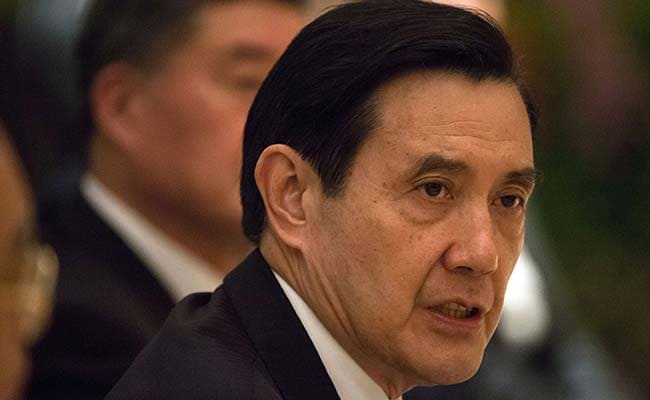
Taiwan President Ma Ying-jeou at the historic summit that will put a once unthinkable presidential seal on warming ties between the former Cold War rivals. (AFP)
Taipei, Taiwan:
Taiwan's President Ma Ying-jeou has hit back at opponents who have accused him of selling out by holding a historic summit with Chinese leader Xi Jinping.
Ma said he had not shied away from referring to Taiwan as the Republic of China (ROC) its official name, which China does not recognise.
"I stated it so clearly," he told broadcaster TVBS in an interview aired on Wednesday.
"No one in history has said it before to the mainland's leader, so I feel I fulfilled my duty as Taiwan's president."
The meeting in Singapore on Saturday was the first between leaders of the two sides since their acrimonious split in 1949 at the end of the Chinese civil war.
Although it is a self-ruling democracy with a fierce sense of its own identity, Taiwan has never formally declared independence from Beijing, which sees it as a renegade province to be reunified with the mainland, by force if necessary.
However, since his 2008 election, Ma and his Kuomintang (KMT) party have bound the island closer to the mainland, with the start of direct flights that have ramped up tourism, and a many-fold increase in Chinese investment.
But his policy of alignment has become increasingly unpopular in Taiwan and the KMT looks set to get a thumping in presidential elections due next year, which the nominally pro-independence Democratic Progressive Party (DPP) appear set to win.
DPP presidential candidate Tsai Ing-wen said the summit was a personal vanity project for Ma, which ran the risk of locking Taiwan too tightly to China.
"(Ma) tried to limit Taiwan's future into a political framework to achieve his own political status, completely taking away the freedom of choice for 23 million people," said Tsai.
"Because, for Taiwanese people, the Ma-Xi meeting. Taiwan's democracy was absent from beginning to end, and didn't see any trace of the existence of the ROC (Republic of China)."
Ma said he had not shied away from referring to Taiwan as the Republic of China (ROC) its official name, which China does not recognise.
"I stated it so clearly," he told broadcaster TVBS in an interview aired on Wednesday.
"No one in history has said it before to the mainland's leader, so I feel I fulfilled my duty as Taiwan's president."
The meeting in Singapore on Saturday was the first between leaders of the two sides since their acrimonious split in 1949 at the end of the Chinese civil war.
Although it is a self-ruling democracy with a fierce sense of its own identity, Taiwan has never formally declared independence from Beijing, which sees it as a renegade province to be reunified with the mainland, by force if necessary.
However, since his 2008 election, Ma and his Kuomintang (KMT) party have bound the island closer to the mainland, with the start of direct flights that have ramped up tourism, and a many-fold increase in Chinese investment.
But his policy of alignment has become increasingly unpopular in Taiwan and the KMT looks set to get a thumping in presidential elections due next year, which the nominally pro-independence Democratic Progressive Party (DPP) appear set to win.
DPP presidential candidate Tsai Ing-wen said the summit was a personal vanity project for Ma, which ran the risk of locking Taiwan too tightly to China.
"(Ma) tried to limit Taiwan's future into a political framework to achieve his own political status, completely taking away the freedom of choice for 23 million people," said Tsai.
"Because, for Taiwanese people, the Ma-Xi meeting. Taiwan's democracy was absent from beginning to end, and didn't see any trace of the existence of the ROC (Republic of China)."
Track Latest News Live on NDTV.com and get news updates from India and around the world

